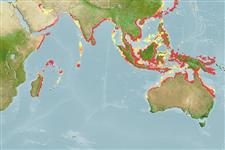Preferred temperature (Ref.
115969): 25.2 - 29.3, mean 28.6 (based on 2815 cells).
Phylogenetic diversity index (Ref.
82804): PD
50 = 0.6250 [Uniqueness, from 0.5 = low to 2.0 = high].
Bayesian length-weight: a=0.00617 (0.00400 - 0.00951), b=3.06 (2.93 - 3.19), in cm Total Length, based on LWR estimates for this species & (Sub)family-body (Ref.
93245).
營養階層 (Ref.
69278): 4.1 ±0.5 se; based on diet studies.
回復力 (Ref.
120179): 中等的, 族群倍增時間最少 1.4 - 4.4年 (Fec=680,000; assuming tm>=2).
Prior r = 0.56, 95% CL = 0.37 - 0.84, Based on 2 data-limited stock assessments.
Fishing Vulnerability (Ref.
59153): Very high vulnerability (90 of 100).
Climate Vulnerability (Ref.
125649): Very high vulnerability (91 of 100).
